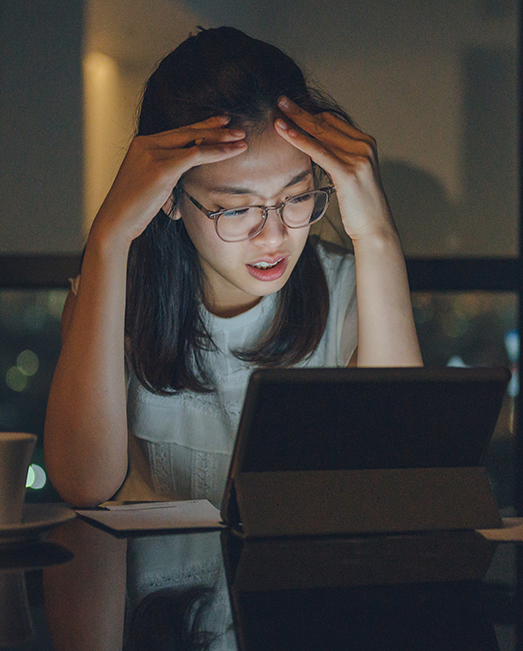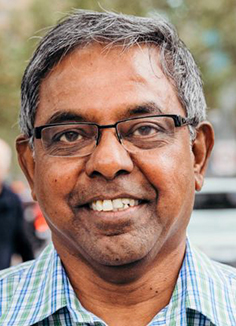Career
Copyright@ Australian Catholic University 1998-2026 | ABN 15 050 192 660 CRICOS registered provider: 00004G | PRV12008
Copyright@ Australian Catholic University 1998-2026 | ABN 15 050 192 660 CRICOS registered provider: 00004G | PRV12008

For many of us, the biggest impact the pandemic has had on our daily lives is that it forced us away from the office (or away from the classroom) and into the home.
This wide-scale shift towards working remotely may have permanently transformed the nature of work and the personal and family lives of employees.
But while many people view the work from home trend in a positive light, it does have some experts worried.
Dr Sugumar Mariappanadar is a Fellow of the College of Organisational Psychologists, Australian Psychological Society specialising in sustainability and sustainable human resource management. He argues that while working from home can be beneficial for employers and employees alike, in the long run, it can also have some dangerous consequences.
“When the pandemic came along and almost everyone started working from home, it was viewed as overwhelmingly positive because of the freedom and flexibility it provides,” says Dr Mariappanadar, an academic and researcher at ACU’s Peter Faber Business School.
“The problem is that when your work environment is also your living environment, it can be very hard to disengage from work. And when you can’t disengage, health and wellbeing problems will arise.”
In 2015, Dr Mariappanadar developed the Health Harm of Work scale, a research questionnaire that addresses a range of work factors that restrict employees from the non-work related activities that improve positive health.
He has since used this scale in his research, including in a wide-scale study that was presented at the Australian Psychological Society’s 2021 Industrial and Organisational Psychology Conference.
Surprisingly, the study of 605 white-collar employees found that work intensification often improved the mental wellbeing of individuals.
“It’s a surprising finding,” Dr Mariappanadar says, “because in the literature, it is almost always stated that work intensification has a negative impact on wellbeing.”
He believes that many employees relish the challenge that comes with working longer and harder.
“When working is viewed as a challenge or a test, people can start to feel like they’re superhuman, and they want to do extraordinary things,” he says.
“That’s where this research was an eye-opener for us because it shows us that work intensification can actually improve mental wellbeing. It’s not always a negative thing.”
A growing body of research is showing that working from home tends to result in increased productivity.
In many cases, this is achieved through work intensification, which is partly as a result of the pressure employees feel to prove their productivity. Known as “work from home guilt”, this phenomenon results in employees overcompensating and working more than they would from the office.
“We feel guilty because no one is supervising us, but we think it’s okay because we’re superhuman, and hence, we do more,” says Dr Mariappanader, who recently discussed the potential hazards of working from home on ABC Radio.
Ambitious workers will often lap up these startlingly long hours in return for the purported flexibility and freedom of working remotely.
“So you work hard and you feel superhuman, you make economic gains and build a good life for yourself and those around you, and that improves your wellbeing,” Dr Mariappanader says.
“But you simply can’t keep going at that rate forever, and that’s why working from home is a double-edged sword. People find that they’ve reached a tipping point, or what I call the ‘ceiling effect’ of human energy, and this can have a range of long-term negative impacts on mental wellbeing and health.”
That tipping point is often reached when work regularly encroaches on non-work activities, like going to the gym, taking the dog for a walk or spending time with loved ones.
“This creates anxiety,” he adds. “You feel down. You might start to use coffee and alcohol as a crutch, and that affects sleep and so on. It all comes back to the ability to disengage. If you can’t disengage from work, you’ll eventually find yourself in a downward health and wellbeing spiral.”
This downward spiral doesn’t only occur to those who work from home. It can happen in a range of work environments.
You might be an engineer working on a major public project, where you’re personally liable for the high-stakes decisions you make on the job. Or a nurse working in a hospital, where people’s lives are at stake.
“You might think, ‘Well, when a doctor or a nurse clocks off from work, they can disengage totally, but that’s not always true,” Dr Mariappanader says.
“They might have made a difficult decision about a patient, and they’re not too sure they’ve done the right thing. So they go home and they can’t disengage because they ruminate over that decision.”
This inability to disengage can have long-term health impacts, like high blood pressure, high cholesterol or other conditions associated with chronic disease.
Dr Mariappanader’s ‘Health Harm of Work’ scale is focused on predicting poor health outcomes early in the process. It therefore functions as early warning system for leading indicators of the health impacts of work intensification.
In 2018, Dr Mariappanadar was instrumental in including these work-related leading indicators in the revised international Occupational Health and Safety Standards of Global Reporting Initiatives of Sustainability. This has allowed corporations to use the Health Harm of Work measure to identify work-related leading indicators, and prevent occupational ill-health for individuals.
He warns that who don’t actively disengage from their job risk working themselves to death.
“In Japan, they have a name for it — ‘karoshi’ — and this overwork culture has proven to be deadly,” says Dr Mariappanader, who points to World Health Organisation research which found that 745,000 deaths from stroke and heart disease were associated with longer working hours.
“It’s killing people, so employees have to find a way to disengage — and businesses need to play a role in ensuring that harm is minimised among their employees.”
Dr Mariappanader hopes his research will prompt corporations and governments to engage in sustainable human resource management practices, which actively encourage employees to engage in practices that allow them to attend to their physical and mental wellbeing.
“Corporations need to play a positive role in this, and to think about long-term sustainability,” he says.
“Yes, you need to grow your business and turn a profit and ensure that productivity is high, but you also have a corporate responsibility to minimise harm, and to fulfill your responsibilities to your people, to the environment, and to society as a whole.”
ACU’s Sugumar Mariappanadar is an internationally-acclaimed researcher in the field of sustainability and sustainable human resource management. He has published more than 50 research articles and authored the first international book on the topic.

Copyright@ Australian Catholic University 1998-2026 | ABN 15 050 192 660 CRICOS registered provider: 00004G | PRV12008